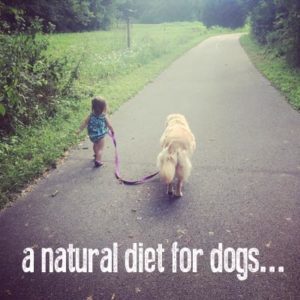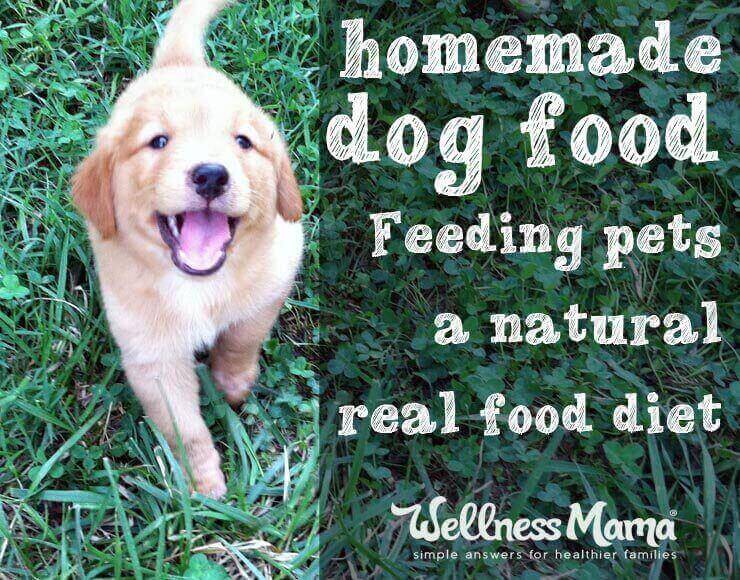I must admit, this post on homemade dog food was written and ready to post weeks ago… but the day before I was planning to publish it our family dog Daisy (pictured in this post) jumped our fence and was hit by a car and killed.
The kids (and I) have taken it pretty hard so I wasn’t ready to publish a post about pets when the loss of our dog was so fresh on my mind.
Since many people think of their dog as part of the family, they want to give their pets the best diet possible. For us this means homemade dog food. A real food diet for pets.
Please always make sure to check with a vet or specialist before making any changes for your pet. I am by no means an animal health expert, and I’m just sharing what worked best for our family.
Homemade Dog Food
Shortly after our transition to real food, I started researching real food diets for pets to figure out what the best options were for our dog and cats. A few things seemed obvious to me:
- Eating the exact same thing every day probably wasn’t healthy for pets.
- Processed grain-based dog and cat foods were obviously not the traditional diets for pets. (Guess what dogs eat in the wild? Hint: It isn’t soy or corn.)
- Our pets went crazy trying to get to certain foods we ate like coconut oil, raw meat, and others.
I researched, checked out several books on the topic, and talked to a vet friend to get an idea of what dogs truly needed. There is an increasing number of good store-bought and even mail-order dog and cat food options, but one idea made a lot of sense…
Most recommended something I had not even considered: homemade dog food.
Once I thought about it, I wondered why I hadn’t thought of this before. The healthiest foods for humans are almost always the ones we prepare fresh at home, so why would it be any different for our pets?
The only difference was that dogs and cats have obviously different nutritional needs, so a strictly human diet (even homemade) was not the best option either. Dogs need enough protein and more calcium than humans. I needed some more guidance about how to make homemade dog and cat food that fit all of their unique nutritional needs.
Dog Food in the Wild
Dogs in the wild don’t eat a cooked, uniform, packaged diet, so perhaps we should consider that dogs in our homes shouldn’t either. In the wild, dogs eat raw meat, bones, organs, and even foliage at times.
Think of it this way: dogs eating pre-made fortified foods enriched with vitamins every single day would be similar to humans subsisting on breakfast cereal. Sure, it may have enough added vitamins to keep you alive, but it would be boring and not optimal for health.
Dogs’ teeth and digestive systems are designed for eating raw meat, bones, and organs. For instance, according to this source,
Dogs and cats have the internal anatomy and physiology of a carnivore (Feldhamer, G.A. 1999. Mammology: Adaptation, Diversity, and Ecology. McGraw-Hill. pg 260.). They have a highly elastic stomach designed to hold large quantities of meat, bone, organs, and hide. Their stomachs are simple, with an undeveloped caecum (Feldhamer, G.A. 1999. Mammology: Adaptation, Diversity, and Ecology. McGraw-Hill. pg 260.). They have a relatively short foregut and a short, smooth, unsacculated colon. This means food passes through quickly. Vegetable and plant matter, however, needs time to sit and ferment. This equates to longer, sacculated colons, larger and longer small intestines, and occasionally the presence of a caecum. Dogs have none of these, but have the shorter foregut and hindgut consistent with carnivorous animals. This explains why plant matter comes out the same way it came in; there was no time for it to be broken down and digested (among other things). People know this; this is why they tell you that vegetables and grains have to be preprocessed for your dog to get anything out of them. But even then, feeding vegetables and grains to a carnivorous animal is a questionable practice.
There are some great books and resources with recipes and instructions for healthy homemade dog foods, but the optimal diet that we settled on for our dog was:
- Raw meats (beef, bison, chicken, etc.)
- Raw bones (turkey necks, shoulder bones, etc.)
- Organ meats (heart, liver, kidney, tongue, etc.)
- Sardines (for extra calcium) – occasionally
- Occasional cooked vegetables like carrots, broccoli, spinach, etc. (this is somewhat controversial and some sources say that dogs should not consume vegetables).
- Occasional canned plain pumpkin (for digestion – some sources don’t recommend this either)
- Probiotics (to replenish the natural bacteria she would have gotten from other animals and the soil if eating a wild diet)
- Bone broth
- Eggs
The Transition to Raw Food for Dogs
A vet friend gave me an important piece of advice about switching to any new diet with a pet… start slowly and work up. We started by adding in small amounts of raw meat each day. We also started with only one new food at a time (similar to how we would introduce foods after an elimination diet in humans).
We gave her raw chicken for a week and once she did ok with that for a week, we added beef, then organs, etc.
Again- check with a vet or holistic pet health expert for specific advice and do your own research before changing your pet’s diet.
What About the Bacteria?
When we started this, I wanted to make sure that the bacteria in raw meat wouldn’t be problematic for our dog. I figured it wouldn’t since wild dogs routinely eat freshly killed small animals and even animal carcasses that are days old. In researching and asking a vet, I found that some dogs can have digestive symptoms when switching to a raw food diet, but this is because of the change in diet and not because of the bacteria specifically.
Dogs are surprisingly well-equipped to deal with bacteria. Their saliva has antibacterial properties; it contains lysozyme, an enzyme that lyses and destroys harmful bacteria. Their short digestive tract is designed to push through food and bacteria quickly without giving bacteria time to colonize. The extremely acidic environment in the gut is also a good bacteria colonization deterrent. (source)
Of course, I was still careful to handle meat safely when giving it to our dog. We only defrosted what was needed and didn’t give her more than she would eat at one time so that it wouldn’t go bad.
A healthy day for Daisy would include raw meat, organ meats and raw bones with other foods in smaller amounts and added probiotics, which seemed to help improve digestion and which might make the transition easier.
Is it Safe to Feed Dogs Bones?
This is another question I had since I’d often heard that it wasn’t safe for dogs to eat certain kinds of bones, especially chicken bones. Again, this doesn’t make sense because whenever Daisy caught a rabbit, she would eat the entire thing, including the bones, without a problem.
Turns out, only cooked bones pose a problem:
Not on raw ones. Cooked bones splinter, and they can get lodged in a dog’s throat. Raw bones are pliable, and the calcium content is absolutely integral to a dog’s health. Plus, chewing bones keeps the teeth clean. No more astronomical dental bills! (source)
Foods to Avoid for Dogs
Foods that are beneficial and healthy for humans are not necessarily healthy for dogs. In researching, I found many foods that should not be given to dogs. Here is a partial list:
- Onions and garlic
- Avocado
- Macadamia nuts
- Caffeine
- Milk
- Anything with xylitol
- Chocolate or caffeine
- Grapes and raisins
- Salt (dogs don’t need as much as we do)
- Anything with yeast
- Others, depending on the dog (check with your vet)
Dog Food Tips

Do some research and find a diet that you are comfortable feeding your dog. For us, this was a mostly raw diet. I found a few tips that helped save time and money feeding our pets this way:
- Make friends with local butchers and try to get inexpensive cuts of meat that aren’t often requested at a discount (turkey necks, organ meats, large knuckle bones, etc.
- Consider adding a probiotic… this greatly helped her digestion
- Our dog didn’t need as much raw food as she did dried dog food… probably because it was more nutrient dense
- I also made homemade dog treats occasionally to add variety to her diet
- To make things easier, I sometimes pre-mixed raw meats, organs, eggs and broth and froze in meal sized portions so that I could defrost as needed
Best Dog Food to Buy: Store-bought Options
While I haven’t made an exhaustive search on the subject, this pet food meal service is one of the only companies I could find that offers a clean dog food. I’ll definitely consider using this when we travel or during busy times when we need a convenient option.
I found the following books helpful for learning about and introducing a raw food diet:
I recently dug into the research on the best CBD treats for dogs too.
What do you feed your dog? Ever tried a raw food diet for your pet? Please share your own tips below!


Leave a Reply